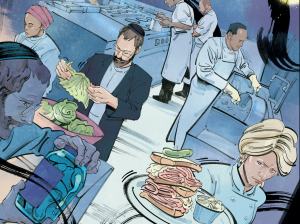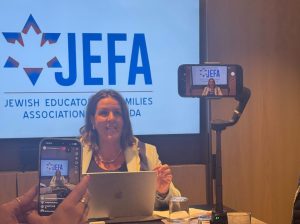Antisemitism is a problem that primarily concerns non-Jews, says Daniel Amar, executive director of the Montreal Holocaust Museum. “It’s our mission to reach them, and empower the educators… There’s no point to combating antisemitism by just talking among Jews.”
That’s the thinking behind a bold five-year research project about antisemitism and Holocaust education, launched by the MHM with a May 27 seminar for Quebec researchers, academics and students, with a very specific, francophone focus.
Collaborating with Université du Québec à Montréal (UQAM), Université Laval in Quebec City and Université de Sherbrooke, the museum hopes to help forge a new generation of Quebec researchers and educators specializing in antisemitism and the Holocaust.
Meanwhile, the next step in the MHM plan is commissioning a multi-year longitudinal study with UQAM sociology professor Guillaume Dufour, who will look at perceptions and realities surrounding antisemitism among both native and immigrant, Jewish and non-Jewish communities, in both Quebec and France.
“We want to have the first survey to measure the evolution of antisemitism in Quebec,” Amar told The CJN. “What is the new phase of antisemitism? What is domestic and what is imported? And what is the real impact on antisemitism from the Middle East conflict, how Jews and Arabs in Quebec deal with this.”
Any initiative to see Holocaust education in Quebec become effective in the fight against antisemitism requires a renewed cadre of francophone scholarship, say organizers, something the province currently doesn’t have.
“Our main goal is to reach francophones in Quebec and Canada, to sensitize them how to teach Holocaust and combat antisemitism,” Amar told The CJN, with the ultimate goal of creating a chair in Holocaust studies and antisemitism at a Quebec university, while encouraging the next generation of academics in these fields.
Dozens of scholars from across Quebec converged at the Federation CJA campus and exchanged ideas on the history of Jews in Quebec, antisemitism, and current trends in Holocaust education. The day featured a keynote address from Eva Illouz, professor of sociology at Hebrew University of Jerusalem and research director at the École des hautes études en sciences sociales in Paris, who spoke to attendees about what she called—and titled her book—the “généalogie d’une haine vertueuse (Genealogy of a Virtuous Hatred), reflecting on rampant antisemitism in progressive circles.
Even though several Canadian provinces have mandated Holocaust education, researchers note there is a lack of deep research into the effectiveness of Holocaust education on antisemitic attitudes. The MHM project seeks to fill that void.
“We don’t have many experts who want to reach out to students in universities in Quebec to take in charge, to be the next generation, to become the new experts,” said MHM deputy director-general Audrey Licop. “We have to create our own experts on Holocaust education and antisemitism, which there are a lot of in Europe, a lot in the United States, but not that many in Canada, and very few in Quebec. That’s not because of lack of interest,” she says, but rather, “a lack of professional opportunities for young researchers.”
While mandatory Holocaust education has been — or is in the process of being — adopted in various forms in Ontario, Manitoba, Saskatchewan, Alberta, British Columbia and Nova Scotia, it’s not currently the case in Quebec. The theme is, however, taught in Secondary 2 History with a human rights angle, and by teachers’ independent initiatives through language arts and ethics. But rest assured it’s coming, says Licop, likely “as part of genocide education.”
A stumbling block towards the anti-racist educational model many experts advocate, however, is “the current Quebec government doesn’t recognize systemic racism, and this is very important in the reflection about fighting racism and antisemitism, because you have to address the concept,” says Université de Sherbrooke education professor specializing in history education, racism and genocide, Sabrina Moisan.
Moisan told The CJN the way the Holocaust is taught in Quebec through the 20th century lens of liberties and civil rights “is a very peculiar approach,” and left to individual teachers to pursue a broader goal, that is, not only focus on the loss of human rights, but also on human lives, the whole event. “Why did that happen? How did it happen, and what were the consequences? Most of the time, even if the teacher’s goal is to ensure kids develop compassion or empathy with Jewish people, I’m not sure that they always succeed.”
“We have a tendency in Quebec to focus a lot on the actions of the perpetrators: Who were the Nazis? What was their ideology and their goal? They focus on the mechanism behind genocide, but often leave out the victims,” says Moisan. They tend to omit the antisemitism, which fueled the Holocaust and has endured and evolved across eras, cultures and geography.
Moisan, who has been researching the topic for 15 years, says while educators try to humanize Jewish victims through life stories and inviting survivors into classrooms, “even though they studied the Holocaust, many kids can’t answer very clearly why Jews were targeted by the Nazi regime. They know Nazis hated Jews, but many teachers put the Holocaust mainly within a Second World War context, and so they will contextualize the Holocaust with causes of the Second World War. It’s easy to understand how you can slide away from the real causes.”
Having collaborated with Laval’s Sivane Hirsch to produce a genocide teaching guide in 2022, Moisan says the path to more successful Holocaust education and the fight against antisemitism is multi-faceted. “We have to first consider the education system, and history education, specifically where we consider actors in the classroom—teachers with their own idea of what the Holocaust is and how and why to teach about it, because they don’t always have a lot of time to learn more about each topic.”
The program must also be made mandatory, because it will compel teachers to find tools and resources to teach complex concepts, “and when the request from the ministry is clear enough, it is clear what teachers have todo. It’s easier for them to apply for resources, and for the publishing houses to create materials. Everything is more coherent.”
Students come to class with their own understanding of the Holocaust, she says, learned from movies, their families or myriad other sources. “They may want to learn about it, or don’t want to hear about it, particularly if they come from a different cultural context. Sometimes they can be antisemitic themselves.”
Moisan maintains anti-racism education is key for students and society in general to understand racism in a complex way, by placing the focus on the student and their place in the broader societal context, to create, in effect, better citizens, and antisemitism is the perfect example.
“We often define antisemitism as hatred of Jews, but that’s not what it is. Antisemitism is extremely complex, and much bigger than hate; it’s a world view, and has an effect on so many layers of society that you can be antisemitic without even knowing it, just by repeating ideas that seem so natural out there.”
“If you talk about anti-Black racism, anti-Chinese racism, they all have their own specificities. Anti-racist education will focus on these specificities and how they change, on how antisemitism changed from the Christian era; how it began, evolved through time, and how it changes accordingly.” Antisemitism exists in Quebec, she agrees, “and has many forms, depending on the small groups you’re looking at, and it expresses itself in specific ways. If you don’t study that, you can’t recognize it, and you cannot act on it.”
Amar says Quebec education ministry staff in attendance “were very interested by the way we are dealing with the issue, and my feeling is we can count on their support if we come with a recommendation.” Licop says “it’s a matter of changing the mindset of the educational establishment.”
Whatever approach is taken, all agree, it must be backed by credible research and solid results. Enter the MHM program, says Moisan.“That’s why we came together, because we know there are not so many people in the francophone communities working on these questions. How do we challenge a younger generation of researchers that come to this topic? We have to train them and make it more visible. It is so important and there’s an urge to do something. We are doing this work, each of us, in our own context and coming together makes it really powerful.”
Mathieu Gelbhart attended the seminar, the Paris-raised Jew saying he has reason to both rejoice and worry. Having studied political science and religious studies at the Sorbonne and Université de Montreal and UQAM, he has concerns for the future of Quebec academia if there continues to be a shift in the traditional view of professors in the French tradition.
There has always been a major difference between francophone and anglophone universities he told The CJN. Francophones typically view the role of a professor as someone who transmits knowledge rather than fostering activism, he said.
“I’m seeing that change a bit, in terms of students becoming social science teachers, who’ve been told everything is a conflict. That’s fine, because political science is studying conflicts, of ideas, of eras, even war. But a lot of them think that to be a good student, they don’t only need to study conflict, they need to live conflict, to be involved. If a student is more moderate or not expressing that by going out into the streets,” says Gelbhart, “when they speak in class, they’ll be judged not by what they are saying, but who they supposedly ‘belong’ to.” With the new wave of academia, he says, “political ideologies come first.”
He also shared what he sees as an opportunity for the Jewish community to embrace Quebec institutions and look at how the province has evolved since the eras that saw the birth of the Jewish General Hospital and private Jewish schools due to antisemitism. “It’s 2025, it’s a different province, a different way to evolve.” The Jewish community must also evolve he says, and that should include sending more students to francophone universities.
Author

Joel has spent his entire adult life scribbling. For two decades, he freelanced for more than a dozen North American and European trade publications, writing on home decor, HR, agriculture, defense technologies and more. Having lived at 14 addresses in and around Greater Montreal, for 17 years he worked as reporter for a local community newspaper, covering the education, political and municipal beats in seven cities and boroughs. He loves to bike, swim, watch NBA and kvetch about politics.
View all posts








